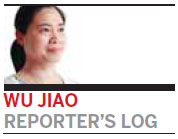The Fortaleza summit of the BRICS leaders is a milestone. For the first time, the meeting of the group's five members is not merely a business forum but is branded with strong political elements.
Global politics - including unrest in Iraq and Ukraine - are part of the summit discussions.
The political aspects are reflected in the Fortaleza Declaration issued by the leaders on Tuesday.
The proportion of the agenda that is devoted to political elements greatly outweighs that of previous years. For the first time the discussions include political coordination. The first part of the leaders' private dialogue dealt with global governance and regional crises. The second part deals with economic and financial cooperation.
Observers said the inclusion of the political agenda would give developing nations an increasingly united voice, and thus more clout on major global issues.

To that end, the sixth BRICS summit has embarked on a course that positions the group for a bigger role in both the political and economic spheres of the world, and to compete with Western countries for an equal voice.
The BRICS nations account for 29.6 percent of the world's territory, and more than 42 percent of its population. Last year, the members' combined GDP was 21 percent of the world's total. Despite slowing growth, the members' economies have expanded twice as fast as those of developed countries.
Understandably, after building strong economic bonds, the BRICS group wants to see a new international political architecture to serve their long-term strategic interests.
A key interest is strengthening the rule of international law and the United Nations' leading role in the international system, which can further ensure a sound economic environment for emerging economies.
The five BRICS members may not share the same positions on every topic, but collectively they have great potential to boost cooperation in both the political and cultural sectors.
The group has laid a sound foundation for regular political dialogue and communication, as it has developed the practice of mutual consultations and joint actions in international organizations, especially at the UN.
Yet BRICS is still a very young group, and is operating in a global economy that remains dominated by developed countries.
The Trans-Pacific Partnership agreement that the United States is negotiating with 11 other countries throughout the Asia-Pacific region, and the Transatlantic Trade and Investment Partnership negotiations between the European Union and the US, have not included a single participant from BRICS.
That's a vivid demonstration that the leading emerging economies, which might pose a challenge to the Western-dominated trade system, have been sidelined in the rule-setting games of global trade.
If BRICS countries succeed in their ongoing economic structural adjustment and maintain momentum in growth, the group will play a bigger role in the global economy and have a more solid foundation from which to build political momentum on the global stage.
Contact the writer at wujiao@chinadaily.com.cn
